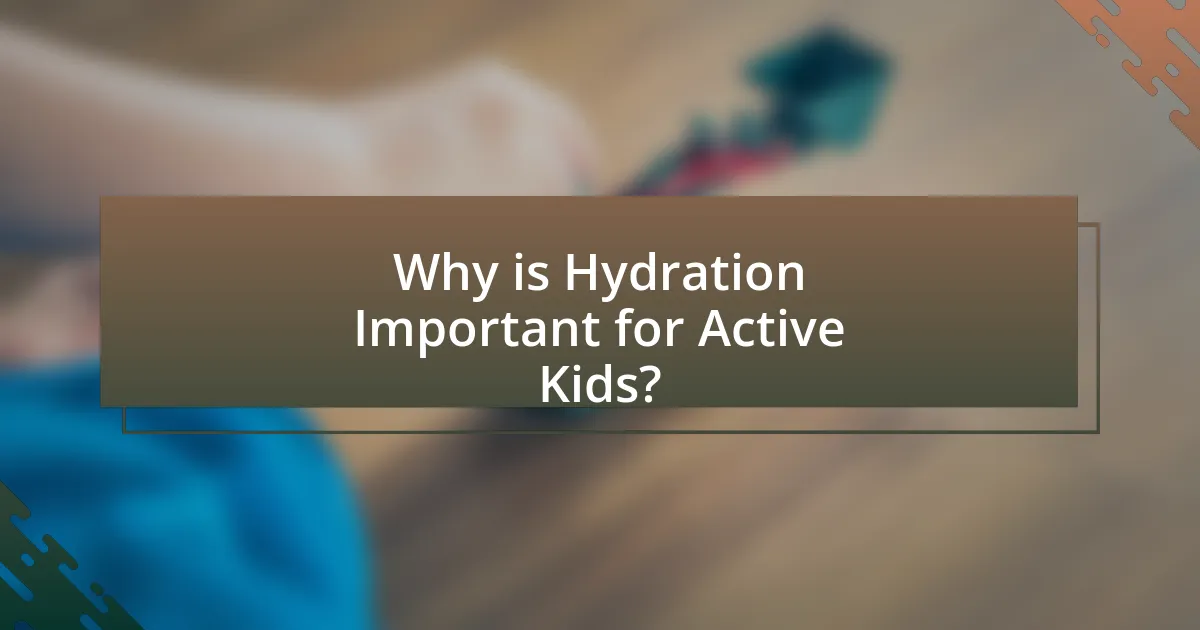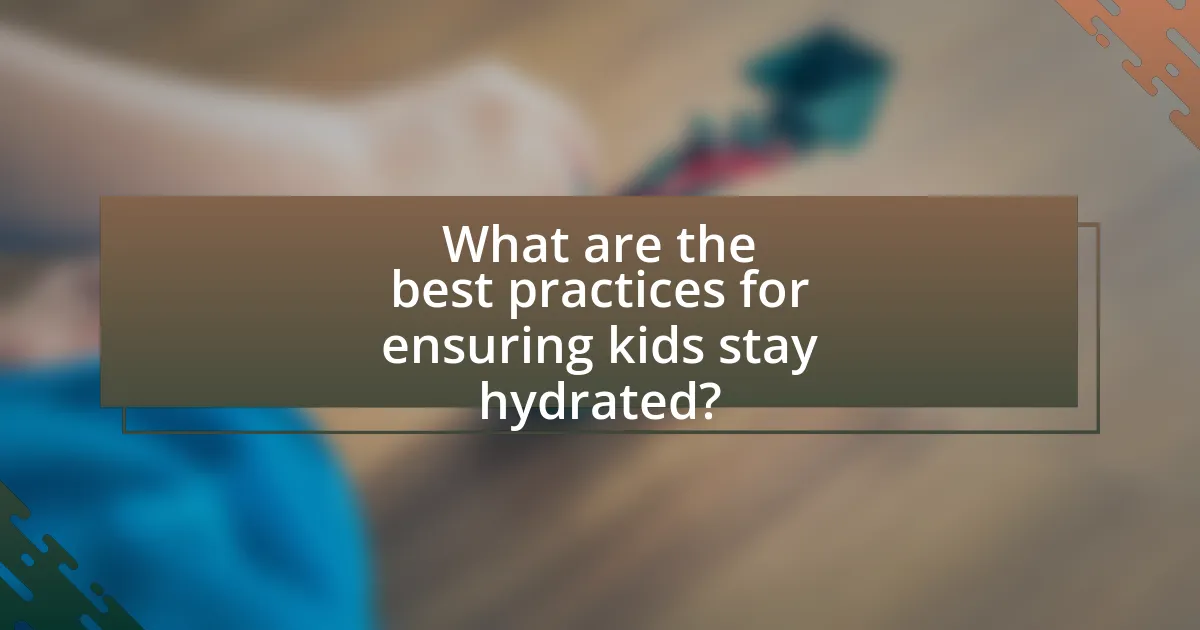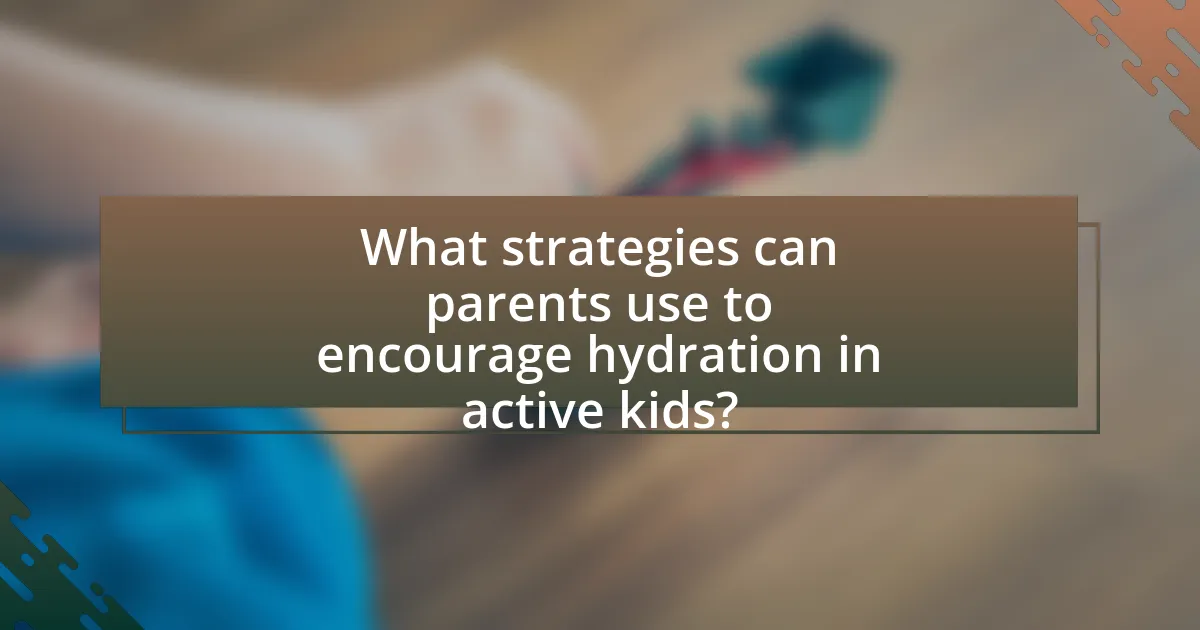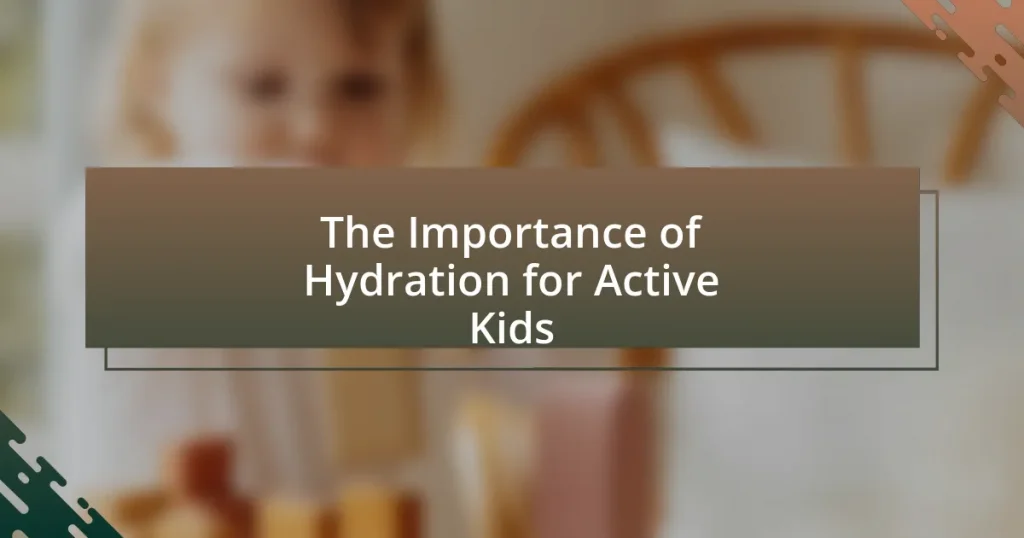Hydration is essential for active kids as it directly impacts their physical performance, cognitive function, and overall health. Children lose fluids through sweat during physical activities, and even mild dehydration can lead to decreased endurance, impaired concentration, and increased risk of heat-related illnesses. The article outlines the physiological effects of dehydration, signs to watch for, and the importance of maintaining adequate hydration levels through water and hydrating foods. It also provides practical tips for parents to encourage regular fluid intake and dispels common misconceptions about hydration needs in children.

Why is Hydration Important for Active Kids?
Hydration is crucial for active kids because it supports physical performance, cognitive function, and overall health. When children engage in physical activities, they lose fluids through sweat, which can lead to dehydration if not replenished. Dehydration can impair their ability to concentrate, reduce endurance, and increase the risk of heat-related illnesses. Studies indicate that even a 2% loss of body weight due to dehydration can negatively affect athletic performance and cognitive abilities. Therefore, ensuring that active kids stay properly hydrated is essential for maintaining their energy levels and promoting optimal physical and mental functioning.
What are the physiological effects of dehydration on children?
Dehydration in children leads to significant physiological effects, including impaired thermoregulation, decreased cognitive function, and reduced physical performance. When children are dehydrated, their bodies struggle to maintain a stable internal temperature, which can result in heat-related illnesses. Studies indicate that even mild dehydration can negatively impact cognitive abilities, leading to difficulties in concentration and increased fatigue. Furthermore, dehydration can reduce endurance and strength, making physical activities more challenging and less effective. According to the American Academy of Pediatrics, children are particularly vulnerable to dehydration due to their higher surface area-to-volume ratio and greater fluid turnover compared to adults, emphasizing the critical need for adequate hydration during physical activities.
How does dehydration impact physical performance in kids?
Dehydration significantly impairs physical performance in kids by reducing their endurance, strength, and overall athletic ability. When children are dehydrated, even a loss of 1-2% of body weight can lead to decreased coordination, increased fatigue, and impaired cognitive function, which are critical for sports and physical activities. Research published in the Journal of Athletic Training indicates that dehydration can lead to a 10-20% decrease in performance in young athletes, highlighting the importance of maintaining proper hydration levels during physical exertion.
What are the signs and symptoms of dehydration in active children?
Signs and symptoms of dehydration in active children include increased thirst, dry mouth, fatigue, decreased urine output, dark yellow urine, dizziness, and irritability. These indicators arise as the body loses more fluids than it takes in, particularly during physical activity. Research shows that children are more susceptible to dehydration due to their higher metabolic rates and lower body water content compared to adults. According to the American Academy of Pediatrics, even mild dehydration can impair physical performance and cognitive function in children, emphasizing the need for regular fluid intake during activities.
How does hydration influence overall health in active kids?
Hydration significantly influences overall health in active kids by maintaining optimal bodily functions and enhancing physical performance. Adequate fluid intake helps regulate body temperature, supports cardiovascular health, and prevents dehydration-related fatigue, which can impair concentration and physical activity. Research indicates that even mild dehydration can negatively affect cognitive function and physical endurance in children, leading to decreased performance in sports and daily activities. For instance, a study published in the Journal of Athletic Training found that hydration status directly correlates with athletic performance, emphasizing the need for active kids to consume sufficient fluids before, during, and after exercise to sustain their health and activity levels.
What role does water play in energy levels and endurance?
Water is essential for maintaining energy levels and endurance during physical activity. Adequate hydration helps regulate body temperature, transport nutrients, and remove waste, all of which are critical for optimal performance. Studies show that even mild dehydration can lead to decreased endurance, increased fatigue, and impaired cognitive function. For instance, research published in the Journal of Athletic Training indicates that a loss of just 2% of body weight due to dehydration can significantly impair athletic performance. Therefore, staying properly hydrated is crucial for active kids to sustain their energy and enhance their endurance during sports and physical activities.
How does proper hydration support cognitive function during activities?
Proper hydration enhances cognitive function during activities by maintaining optimal brain performance and focus. When the body is adequately hydrated, it ensures efficient blood flow and nutrient delivery to the brain, which is crucial for cognitive processes such as attention, memory, and decision-making. Research indicates that even mild dehydration can impair cognitive abilities, leading to decreased concentration and increased fatigue. A study published in the Journal of Nutrition found that hydration status significantly affects cognitive performance, particularly in tasks requiring attention and memory. Therefore, ensuring proper hydration is essential for active kids to support their cognitive function during physical activities.

What are the best practices for ensuring kids stay hydrated?
To ensure kids stay hydrated, it is essential to encourage regular water intake throughout the day. Parents and caregivers should provide easy access to water, such as keeping water bottles handy during activities and meals. Research indicates that children are more likely to drink water when it is readily available, as they may not recognize their thirst until they are already dehydrated. Additionally, incorporating water-rich foods like fruits and vegetables into their diet can significantly contribute to overall hydration. Studies show that foods like watermelon and cucumbers contain high water content, which aids in maintaining hydration levels. Monitoring urine color can also serve as a practical indicator; pale yellow urine typically signifies adequate hydration, while darker urine suggests a need for more fluids.
How much water do active kids need daily?
Active kids need approximately 7 to 10 cups (1.6 to 2.4 liters) of water daily, depending on their age, activity level, and climate. This recommendation aligns with guidelines from the Institute of Medicine, which suggests that children aged 4 to 8 years should consume about 5 cups (1.2 liters), while those aged 9 to 13 years require around 7 to 8 cups (1.6 to 1.9 liters). Active children may need more fluid to compensate for water loss through sweat during physical activities.
What factors influence hydration needs in children?
Hydration needs in children are influenced by factors such as age, activity level, climate, and overall health. Younger children typically require more fluids relative to their body weight compared to older children due to their higher metabolic rates. Increased physical activity raises fluid loss through sweat, necessitating greater hydration. Hot and humid climates further exacerbate fluid loss, increasing hydration needs. Additionally, health conditions such as fever or diarrhea can lead to increased fluid requirements to prevent dehydration. These factors collectively determine the appropriate hydration levels necessary for maintaining health and performance in children.
How can parents assess their child’s hydration status?
Parents can assess their child’s hydration status by observing physical signs and monitoring fluid intake. Key indicators include checking for the color of urine, where light yellow suggests proper hydration while dark yellow indicates dehydration. Additionally, parents should note their child’s thirst levels; increased thirst often signals a need for more fluids. Monitoring for symptoms such as dry mouth, fatigue, or decreased urine output can also provide insights into hydration levels. Research indicates that children are particularly susceptible to dehydration during physical activity, making these assessments crucial for maintaining their health and performance.
What types of fluids are best for hydration?
Water is the best fluid for hydration. It effectively replenishes lost fluids without added sugars or calories, making it ideal for maintaining hydration levels in active kids. Studies show that water is essential for various bodily functions, including temperature regulation and nutrient transport. Additionally, electrolyte drinks can be beneficial during prolonged physical activity, as they help replace lost salts and minerals. However, for everyday hydration needs, plain water remains the most effective choice.
What are the benefits of water versus sports drinks for kids?
Water is generally more beneficial than sports drinks for kids, primarily because it effectively hydrates without added sugars or calories. Water helps maintain optimal hydration levels, which is crucial for physical performance and cognitive function in children. In contrast, sports drinks often contain high levels of sugar and electrolytes that may not be necessary for kids engaged in typical physical activities. Research indicates that excessive sugar intake can lead to health issues such as obesity and dental problems. Therefore, for most children, especially those participating in moderate exercise, water is the preferred choice for hydration.
How can fruits and vegetables contribute to hydration?
Fruits and vegetables contribute to hydration by providing high water content, which helps maintain fluid balance in the body. For instance, cucumbers contain about 95% water, while watermelon is approximately 92% water. Consuming these foods can significantly increase overall fluid intake, which is crucial for active kids who lose water through sweat during physical activities. Studies indicate that adequate hydration supports cognitive function and physical performance, making fruits and vegetables an essential part of a hydration strategy for children.

What strategies can parents use to encourage hydration in active kids?
Parents can encourage hydration in active kids by making water easily accessible and incorporating it into their daily routines. Providing water bottles that kids can carry during activities ensures they have constant access to hydration. Additionally, parents can set regular hydration breaks during playtime or sports, reminding kids to drink water at specific intervals. Offering flavored water or adding fruits to water can make it more appealing, increasing the likelihood that kids will drink more. Research indicates that children are more likely to stay hydrated when they perceive drinking water as enjoyable, highlighting the importance of making hydration fun and engaging.
How can parents make hydration fun for their children?
Parents can make hydration fun for their children by incorporating creative and engaging methods such as using colorful water bottles, adding fruit slices to water, and creating hydration challenges. Colorful water bottles can attract children’s attention and encourage them to drink more water throughout the day. Adding fruit slices, like lemon or berries, not only enhances the flavor but also makes the drink visually appealing, which can entice children to hydrate. Additionally, setting up hydration challenges, such as tracking water intake with stickers or rewards, can motivate children to drink more water while making it a game. These strategies are effective because they transform hydration into an enjoyable activity, promoting better hydration habits in children.
What creative ways can parents incorporate hydration into daily routines?
Parents can incorporate hydration into daily routines by making water accessible and appealing through various strategies. For instance, they can use colorful, fun water bottles that children can personalize, encouraging them to drink more throughout the day. Additionally, parents can infuse water with fruits like lemon, berries, or cucumber to create flavored water, making it more enticing for kids. Research indicates that children are more likely to drink water when it is visually appealing and tastes good, which can significantly increase their overall fluid intake. Furthermore, setting hydration reminders during activities, such as before and after sports or playtime, can help establish a routine that prioritizes drinking water.
How can parents educate their kids about the importance of hydration?
Parents can educate their kids about the importance of hydration by incorporating fun and engaging activities that highlight its benefits. For instance, parents can explain how water helps maintain energy levels and supports physical performance, which is crucial for active kids. Research indicates that even mild dehydration can impair physical performance and cognitive function, making it essential for children to stay hydrated, especially during sports and outdoor activities. Parents can also use visual aids, such as charts showing daily water intake recommendations, and encourage kids to track their water consumption through apps or journals. By making hydration a regular topic of conversation and modeling good hydration habits themselves, parents can instill the importance of drinking water in their children’s daily routines.
What are common misconceptions about hydration for kids?
Common misconceptions about hydration for kids include the belief that they only need water when they are thirsty and that all fluids are equally hydrating. Research indicates that children may not recognize their thirst until they are already dehydrated, making it essential for caregivers to encourage regular fluid intake throughout the day. Additionally, while beverages like juice and sports drinks contribute to hydration, they often contain sugars and calories that can be detrimental to a child’s health if consumed in excess. The American Academy of Pediatrics emphasizes that water is the best choice for hydration, particularly during physical activity, as it effectively replenishes fluids without added sugars or calories.
Why do some people believe kids don’t need to drink water during play?
Some people believe kids don’t need to drink water during play because they think children can rely on their natural thirst cues to stay hydrated. This belief is often based on the assumption that kids will drink when they feel thirsty, which can lead to underestimating the risk of dehydration during physical activity. Research indicates that children may not always recognize their thirst until they are already dehydrated, making it crucial for caregivers to encourage regular fluid intake, especially during prolonged play or exercise.
What myths exist about hydration and sports performance in children?
Myths about hydration and sports performance in children include the belief that children do not need to hydrate as much as adults, that thirst is a reliable indicator of hydration status, and that sports drinks are necessary for young athletes. Research indicates that children are at a higher risk of dehydration during physical activity due to their smaller body size and higher metabolic rates. The American Academy of Pediatrics emphasizes that children should drink fluids regularly, not just when they feel thirsty, as they may not recognize dehydration symptoms until they are already affected. Additionally, studies show that water is generally sufficient for hydration during most youth sports, and the use of sports drinks can lead to excessive sugar intake, which is unnecessary for children engaged in typical physical activities.
What practical tips can parents implement to ensure their kids are hydrated?
Parents can ensure their kids are hydrated by encouraging regular water intake throughout the day. Establishing a routine where children drink water at specific times, such as before meals and after physical activities, helps reinforce this habit. Additionally, providing water bottles that are easily accessible can motivate kids to drink more frequently. Research indicates that children are more likely to drink water when it is readily available, as highlighted in a study published in the Journal of Nutrition, which found that easy access to water increases hydration levels in children. Furthermore, incorporating hydrating foods like fruits and vegetables into meals can supplement their fluid intake, as these foods contain high water content.
